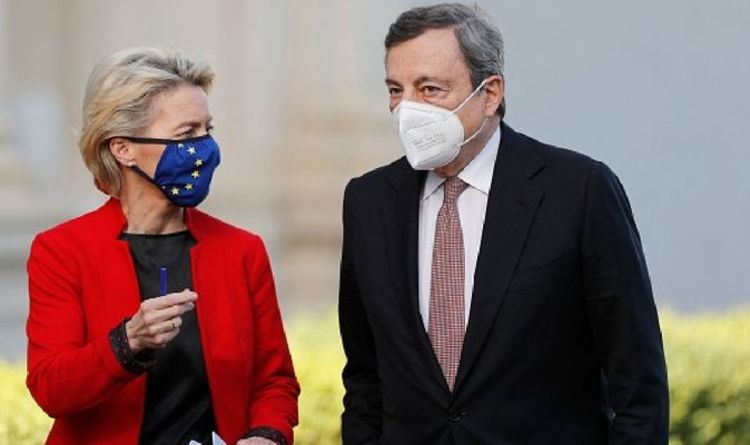Italy: Politicians protest vaccine passport rules in Parliament
We use your sign-up to provide content in ways you’ve consented to and to improve our understanding of you. This may include adverts from us and 3rd parties based on our understanding. You can unsubscribe at any time. More info
Italian Prime Minister Mario Draghi agreed to scrap TV licences fees from electricity bills, a policy introduced by former Prime Minister Matteo Renzi in a bid to clamp down on tax evasion. For reasons of transparency and respect for competition, Brussels asked for the elimination of “improper charges” from energy costs.
The elimination of the RAI (Italian state broadcasters) fee from the electricity bill, therefore, responds to the commitments made by the Draghi government with the European Union within the National Recovery and Resilience Plan, which promises the cancellation of the obligation for electricity sellers to “collect through bills, sums that are not directly correlated with energy”.
Italians pay 9 euros a month for 10 months directly into the electricity bill for their TV licences.
The reform was introduced by the Renzi government at the end of 2015 to tackle public TV tax evasion.
It used to cost €113 per year, but few really paid.

Forcing Italians to pay the fee, by charging the invoices issued by the electricity companies, has solved the problem of evasion, with the drawback, however, of making the energy bills appear much more expensive than the actual consumption of power.
Therefore Brussels has spared no criticism of the Italian government over the years.
The move, however, ensured a decrease in tax evasion from 30 percent to just four percent, with extra takings of €420million into the state pockets.
Critics of Draghi’s commitment to the EU fear a return to the past would also mean honest Italians will pay the price of a higher fee to compensate for those who will simply stop paying.
The law will be debated and voted on in September and is expected to spark a wider debate about switching to a subscription model for the state broadcasters.
The hypothesis of abolishing the RAI fee from electricity bills received support “with flying colours” from Codacons.
The consumers association said: “The inclusion in the RAI fee in electricity bills represented a real harassment to the detriment of users, who found themselves paying higher bills due to the decision of the Renzi government.”
A much more cautious position, reports Corriere della Sera, is that one taken by Usigrai, the RAI journalists union: “The discussion on the fee in the bill shows that there is no future for RAI if the question of certainty of resources is not resolved”.
DON’T MISS:
Brexit LIVE: Who needs EU? UK exports soar 20% since referendum [LIVE BLOG]
Blair’s own son turns on father as he ferociously tears apart ex-PM [INSIGHT]
EU ready to issue final Brexit ultimatum over border row [ANALYSIS]

The union stressed that what matters “is that the Public Service finally has certain, long-lasting, autonomous and independent resources.
“In order to be able to make a serious industrial plan, without depending on the government in office year by year”.
Italy is among the countries in Europe that pay less overall for their TV licence.
Over-75s in Italy still enjoy a free TV licence.
In France, a TV licence costs £117 (€139) and most countries in the EU have either abolished their TV licences or never had one in the first place.
Prices among those that charge for one range between £30 per year (€36) in Greece and £135 (€160) in Ireland.
Only Germany, Austria and Denmark top the BBC’s bill which currently stands at £157.50 per year, respectively with £177 (€210), £283 (€335) and £220 (€259) per year.
In the UK, the BBC introduced a temporary payment amnesty amid the pandemic.
However, they confirmed at the end of June that 3.6 million of the 3.9 million people aged over 75 who needed to pay £158 for an annual TV licence had done so.
Those left outstanding would receive letters to remind them and provide support.
Morgan Vine, head of policy and influencing at the charity Independent Age, said the extra financial outlay means Britain’s eldest risk “losing access to what is often their lifeline to the outside world”.
She added: “The decision to link free TV licences for the over 75s to Pension Credit will not do enough to protect low income older people’s access to television.”
Source: Read Full Article
